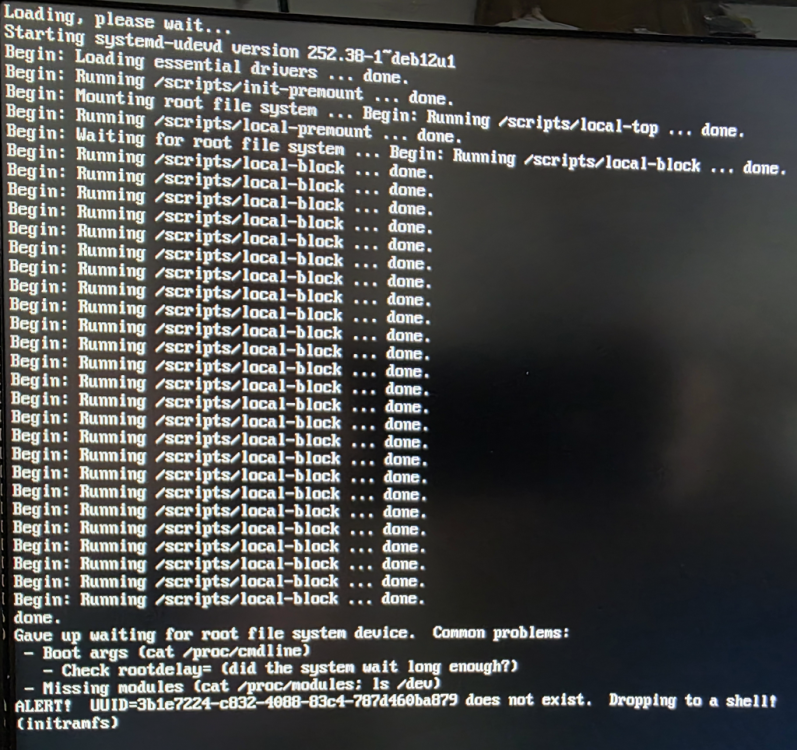All Activity
- Past hour
-
you burned to microsd, then burned to microsd. What?
-
How long did you wait for this? if you for example use a quite large microsd card that however has a slow pace this may take a few minutes.
- Today
-
I've downloaded the Armbian 25.5.1 (Kernel 6.12) Home Assistant image (https://dl.armbian.com/orangepi5-plus/Bookworm_current_minimal-homeassistant), burned to microsd and rebooted the orange pi 5 plus. I burned the image to a microsd cards, inserted the microsd and did a hard reboot of the SBC. The error message is "Gave up waiting for root filesystem device."
-
I don't have time to work on this right away, so to make sure this does not fall off the radar, I opened a ticket in the tracker.
-

Does exist a stable, old, low temperature version of Armbian for OPi1
laibsch replied to psygnosis's topic in Orange Pi One
OK That would be called regression and should be analysed for a fix moving forward. Specifically looking for an older release as a "solution" still seems misguided and should only be done to bisect not as a kind of permanent solution. -
Successful playing of H264 1080p mp4 Orange pi zero 3, 1GB Self-built Bookworm, with XFCE desktop Linux edge 6.15.4 No changed linux configurations Using ffmpeg+libraries provided in the first post of https://forum.armbian.com/topic/32449-repository-for-v4l2request-hardware-video-decoding-rockchip-allwinner/ (you can even install all the bookworm ffmpeg, mpv, then when you add the new repository, update and upgrade, apt will replace the packages with their ffmpeg-v4l2request equivalents) Testing 1080P H264 (warning, some mp4's will actually be AV1 codec), checked with VLC Compositor on or off, doesn't make a difference. Video plays at full 30 fps To avoid video glitches during window resizing: add "extraargs=cma=256M" in /boot/armbianEnv.txt With hwdec=drm-prime, CPU is 50% in all 4 cores With hwdec=drm, CPU is 10% or less in all 4 cores Without HW acceleration, CPU is 100% in all 4 cores with many skipped frames mpv.conf and mpv log: Reveal hidden contents THANK YOU to all who gave me updated information! Edited just now by robertoj
- Yesterday
-
I actually dont remember the exact order of install, but from what i can recall first i compiled and installed libva-v4l2-request-HACK_HEVC.zip and followed that tutorial then i downloaded h618_hwdec.tar.gz from https://www.elektroda.pl/rtvforum/topic4018092.html#20840047, those are the libs i replaced in /lib/aarch64-linux-gnu/ install latest edge kernel from armbian-config (or enable rolling updates), download kernel hearders and enable gpu in device tree overlays to compile mesa first install deps than creat a python venv in mesa src directory to download latest meson in it sudo apt-get install bison build-essential ccache clang cmake flex git glslang-tools libclang-dev libdrm-dev libelf-dev libexpat1-dev libgl1-mesa-dev libgles2-mesa-dev libgoogle-perftools-dev libgtk-3-dev libllvm-18-dev libomxil-bellagio-dev libpciaccess-dev libsensors-dev libspirv-tools-dev libunwind-dev libva-dev libvdpau-dev libvulkan-dev libwayland-dev libx11-dev libx11-xcb-dev libxatracker-dev libxcb-dri2-0-dev libxcb-dri3-dev libxcb-glx0-dev libxcb-present-dev libxcb-randr0-dev libxcb-shm0-dev libxcb-sync-dev libxcb-xfixes0-dev libxdamage-dev libxext-dev libxfixes-dev libxrandr-dev libxshmfence-dev libxxf86vm-dev libzstd-dev llvm-18-dev meson ninja-build pkg-config python3-mako python3-pil wayland-protocols python3-venv python3 -m venv mesa_venv source mesa_venv/bin/activate pip3 install meson but if i tried to compile from inside the venv i was gettin a mako version error so i exited the venv (just open another terminal window) used this exact command to be able to build from outside the python3 venv PYTHON=~/src/mesa/mesa_venv/bin/python3 ~/src/mesa/mesa_venv/bin/meson setup build -Dbuildtype=release -Dprefix=/usr -Dgallium-drivers=panfrost -Dvulkan-drivers=panfrost -Dplatforms=x11 -Dvideo-codecs=all you need to add wayland to platforms if you're using it, i'm not (replace '~/src/mesa/mesa_venv/bin/python3' and '~/src/mesa/mesa_venv/bin/meson' with the path where you cloned the source...) install any other dependencies it complains about then install with sudo ninja -C build install you can confirm with glxinfo -B gabriel@orangepizero3:~/$ glxinfo -B name of display: :0.0 display: :0 screen: 0 direct rendering: Yes Extended renderer info (GLX_MESA_query_renderer): Vendor: Mesa (0xffffffff) Device: Mali-G31 (Panfrost) (0xffffffff) Version: 25.2.0 Accelerated: yes Video memory: 3922MB ... i don't know if that libva hack is working but vainfo recognize gabriel@orangepizero3:~$ LIBVA_DRIVER_NAME=v4l2_request vainfo libva info: VA-API version 1.20.0 libva info: User environment variable requested driver 'v4l2_request' libva info: Trying to open /usr/lib/aarch64-linux-gnu/dri/v4l2_request_drv_video.so libva info: Found init function __vaDriverInit_1_20 libva info: va_openDriver() returns 0 vainfo: VA-API version: 1.20 (libva 2.12.0) vainfo: Driver version: v4l2-request vainfo: Supported profile and entrypoints VAProfileMPEG2Simple : VAEntrypointVLD VAProfileMPEG2Main : VAEntrypointVLD VAProfileH264Main : VAEntrypointVLD VAProfileH264High : VAEntrypointVLD VAProfileH264ConstrainedBaseline: VAEntrypointVLD VAProfileH264MultiviewHigh : VAEntrypointVLD VAProfileH264StereoHigh : VAEntrypointVLD VAProfileHEVCMain : VAEntrypointVLD and finally mpv (with yt-dlp installed) gabriel@orangepizero3:~/$ mpv --hwdec=drm --profile=fast https://www.youtube.com/watch?v=Dyzf2evNjwc (+) Video --vid=1 (*) (h264 1920x1080 29.970fps) (+) Audio --aid=1 --alang=eng (*) (opus 2ch 48000Hz) File tags: Uploader: Zen Mechanics Channel_URL: https://www.youtube.com/channel/UCC8n8afKsdaYuI7Pr0J4pgA Using hardware decoding (drm). AO: [pulse] 48000Hz stereo 2ch float VO: [gpu] 1920x1080 drm_prime[nv12] it is a bit confusing but i hope it helps... i also recommend this moded mpv handler with youtube playlist and mpv prefetch queueing support: https://github.com/gabreek/mpv-handler-queue
-
Using Jun 26's Sid_vendor_server-kali, my Zero 3W is stuck in a loop. I can't "Create a loop password" as it'll instantly jump to the "armbian-security login:" prompt. If I login with the default root:1234, I'll briefly see the welcome screen, followed by a very brief "waiting for the system to finish booting", then it's back to 1. This occurs regardless of internet access (provided by a USB-C ethernet adapter, for which Armbian reports a valid LAN IP address).
-
I've recently upgraded my NanoPi M4 V2 to Armbian_25.2.1_Nanopim4v2_bookworm_current_6.12.13_minimal.img.xz and since that, I have been getting random crashing of it, to the point that I have to manually power it down and up again to get it back running again. The only thing I've noticed is that this normally happens when there is intensive disk usage (like downloading a bunch of docker images, or when downloading large files from the internet). Here's the output from armbianmonitor -u pedro@nanopim4v2:~/docker$ armbianmonitor -u Collecting info and sending to paste.armbian.com, wait... dmesg: read kernel buffer failed: Operation not permitted dmesg: read kernel buffer failed: Operation not permitted https://paste.armbian.com/jefilizufo Please post the URL in the forum where you've been asked for.
-
In the past we had dedicated image for rpi5 ... It could be added here: https://github.com/armbian/build/blob/main/packages/bsp/common/usr/lib/armbian/armbian-firstrun#L112-L122
-
Tried rk3318 debian 12 with linux kernel 6.1.63 or up to 6.12.39 and no hdmi output, I installed on SD card. Though debian 11 with kernel 5.15.35 works Interesting thing that debian 12 with linux kernel 6.16.0-rc3 worked Is there anything I can do to provide useful information to debug?
-
At the same time as mmcblk1 disappeared someone had changed the ethernet port over to the secondary port as I could not get into the machine and tried the second port which had been configured to the same static IP address as the primary port was on.
-
You are right. I just downloaded something from youtube and assumed it was H264. When I checked it in VLC in my PC, the codec is: AOMedia's AV1 video (av01) I picked another mp4, which I verified in VLC as H264-MPEG4, 720p, and it played with 10% CPU This test below is with Bookworm XFCE, compositor ON, Linux 6.15.4 with default configuration Then I repeat the test with a 1080p H264 mp4. mpv tries to use hardware acceleration, but the mpv is black and there's continuous DRM_IOCTL errors: Then I tried this inside /etc/mpv/mpv.conf hwdec=drm-prime drm-drmprime-video-plane=primary drm-draw-plane=overlay and the 1080p H264 starts playing fluidly with just 40% CPU (compositor off) With compositor on, I get same 40% CPU Same video glitches, with or without compositor, but I am getting hardware acceleration (although there's the hwdec unsupported message) Update: Thank you to all who helped me. I have hardware acceleration again with my opiz3 hwdec=drm is more efficient extraargs=cma=256 is needed to avoid memory allocation problems and video glitches. https://forum.armbian.com/topic/29202-orange-pi-zero-3/page/26/#findComment-222596
-
>PLEASE STOP! This is both a time and money nightmare for me. I am giving as much information as I can in order to give feedback in order to get support. What I am posting is not all nonsense ! Okay the Gnome downgrade was incorrect and was based on what ifnformation I could get at the time. Why the issue system put up the postgres tag I really don't know I removed it. It is now repeatedly demostratably kernel dependant. On 6.12.32-current-rockchip64 and 6.12.39-current-rockchip64 the display is failing, 6.12.22-current-rockchip64, and 6.12.17-current-rockchip64 the display is working fine. 6.15.1-edge-rockchip64 is also working fine. No sure about 6.15.7 6.16.0-rc3-edge and 6.16.1-edge are not even booting, with BananaPi-M7. I am going to get kernel output using USB UART for all these boots.
-
Problem solved... My ignorance... For inexplicable reasons, u-boot was updated without an error message, but actually NOT written to the SD card. The ancient version apparently cannot start without uImage. Now I have manually written the SD card - more precisely an image of it - with the new u-boot and then wrote a new SD card from that image, uImage can be deleted and it runs...
-
And it turns out that nothing can be done? For some reason, it works for everyone, but something happened to me and it doesn't work anymore.
-
moved to tvboxes
-
The seller can't help me and sends me to technical support. Technical support sends me to this forum. I bought it here. https://www.ozon.ru/product/tsentr-hab-umnogo-doma-home-assistant-4-64-zigbee-ble-hub-1657561166/
-
I started building mesa 25.2 according to https://docs.mesa3d.org/install.html When I started meson, it complained about meson-1.0.1 is too old (Bookworm)... needs 1.4.0 Trixie will provide meson 1.7... is this what you did? Start with a self built Armbian-Trixie? When you type "replace the libs", do you mean to uninstall debian package, and install the just compiled source? libva2 - Video Acceleration (VA) API for Linux -- runtime Is this independent from ffmpeg (I only see libav in ffmpeg, not libva) Does mpv need any special configuration?
-
Everything works, but I don't know why (;-) I upgraded to a new kernel 6.12.34-current-meson64 and also to the current u-boot. If I take a look at a current armbian image, every image.. vmlinux.. etc. is available in the boot folder, but no uImage. In my boot folder, however, in addition to the these files in the current armbian image, in my boot folder is still is a uImage from 2022. uname -r -> 6.12.34-current-meson6 So the current kernel is loaded and everything works. But if I now delete the uImage from 2022, the computer no longer boots. How does a current armbian image manage to boot without uImage? Is a uImage created at the first start? Manually I have created a new uImage via mkimage -A arm -O linux -T kernel -C none -a 0x01080000 -e 0x01080000 -n "Linux" -d ./vmlinuz-* ./uImage and the computer boots again, without uImage and only with the vmlinuz files not. Long story - can I leave it like that, or is there a way to boot without uImage.
-
How did you flash the u-boot ? Were you able to run armbian with that u-boot and install on the NVME drive? Thanks








